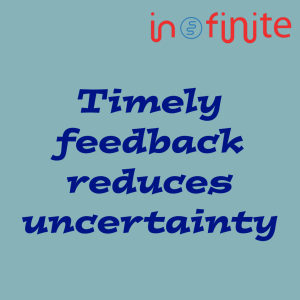A typical job search will see an individual casting about on LinkedIn or Indeed for listings and leads. He or she may splash a resume around, go in for some interviews, provide more compelling information about relevant work histories and backgrounds. And, apart from a possible job offer down the line, that’s about it. The individual is generally left out in the cold.
Now, when a recruiting firm is involved, the picture is a bit different–as long as the recruiter is a clear communicator and a helpful shepherd through the circuitous hiring process.
We’re talking about feedback.
It’s not enough for the recruiter to line up potential gigs. That alone is not helpful to the candidate or even to the prospective employer. As a middle man of sorts, the recruiter must provide active feedback to ensure a successful job search for the candidate–relaying a sense of reality from the employer and dialing in the candidate’s own performance along the way.
So, what does that look like?
Resume and Application Feedback:
Candidates may not always be aware of how their resumes and applications are perceived by potential employers. They may think their resumes look terrific, simply because they’re not processing dozens of them each week. They’re often looking at their resumes in a vacuum.
Feedback on these materials helps candidates understand how well they are presenting their skills and experiences. Constructive feedback guides them in tailoring their resumes for specific roles and showcasing their qualifications effectively.
There’s a thousand ways to write a resume, as the old saying goes. Recruiters can really assist candidates in dialing in the most pertinent details and the most compelling structure. A recruiter may suggest tailoring the content to better match the job requirements, showcasing key achievements, or optimizing the use of relevant keywords. Offering concrete examples and suggesting revisions can guide the candidate in presenting a more compelling application.
 Interview Performance:
Interview Performance:
Candidates often invest time and effort in preparing for interviews. Those interviews can carry high stakes, after all. Detailed feedback on interview performance is essential for candidates to understand their strengths and areas for improvement. This information empowers candidates to refine their interview skills, such as articulating their achievements and responding to common questions from prospective managers more effectively.
After an interview, a recruiting firm can share detailed feedback with the candidate, emphasizing both strengths and areas for improvement. Using specific examples from the interview helps the candidate understand the recruiter’s perspective. Providing guidance on communication style, response clarity, and ways to enhance their performance in future interviews is valuable for candidates seeking continuous improvement.
READY TO GET STARTED? GET IN TOUCH WITH THE IN-FINITE TEAM TODAY
Cultural Fit Assessment:
This is a big one. Cultural fit is increasingly recognized as a crucial factor in job satisfaction and long-term success.
Feedback on cultural fit assessment provides candidates with insights into how their values and working style align with the organization. This helps them make more informed decisions about the types of work environments where they thrive.
When assessing cultural fit, a recruiting firm can engage in open and honest conversations with candidates about the organization’s values and work environment. (Repeat: open and honest.) Offering specific feedback on how the candidate’s values align with or differ from the company culture allows for a transparent discussion. This helps candidates make informed decisions about their compatibility with the organization.
Technical Skills Assessment:
Technical skills are important, of course. There may be little room for acquiring new skills on the fly during the hiring process, obviously, but feedback on those extant skills informs candidates about their proficiency and areas for improvement. This feedback is valuable for candidates seeking to enhance their skill set, either through additional training or practical experience down the line.
This feedback may even turn up skills that the candidate possesses but did not include on his or her resume–an oversight that a recruiter can help correct.
For technical roles, a recruiting firm can provide feedback on the candidate’s skills assessment by specifying areas of strength and areas that may need improvement. Offering recommendations for additional training, certification, or practical experience demonstrates a commitment to the candidate’s professional growth.
Communication Style:
Clear and effective communication is a fundamental professional skill. Recruiters can demonstrate this by bringing their own clear communication to the table when engaging with candidates.
Feedback on communication style helps candidates understand how well they convey ideas and information. This awareness is critical for candidates aspiring to roles that require strong communication skills, and it allows them to work on refining their communication approach.
This goes back to the post-interview feedback: There’s always room for improvement, after all.
Feedback on communication style can be communicated through specific observations, such as clarity of expression, active listening, and professionalism. Providing examples of effective communication and suggesting ways to enhance verbal and written communication skills can guide candidates in refining their overall communication style.
Areas for Professional Growth:
Offering guidance on areas for professional development provides candidates with a roadmap for advancing their careers. This feedback helps them set realistic goals for skill enhancement and career progression. Candidates who receive guidance on professional growth are better equipped to navigate their career paths strategically.
Communicating areas for professional growth involves offering tailored advice and guidance. A recruiting firm can discuss specific skills or experiences that would enhance the candidate’s marketability and career prospects. Providing resources, such as suggested courses or networking opportunities, shows a commitment to the candidate’s long-term success.
Encouragement and Positive Reinforcement:
Job searching can be a challenging and sometimes disheartening process. Positive reinforcement acknowledges the candidate’s strengths and achievements, boosting their confidence. This encouragement is not only uplifting for the candidate but also contributes to a positive overall experience with the recruiting agency.
Positive reinforcement can be communicated through genuine and specific praise for the candidate’s achievements and strengths. A recruiting firm can acknowledge the candidate’s unique qualities and express confidence in their potential. Offering positive feedback fosters a supportive relationship and encourages candidates to approach their job search with optimism.
Next Steps and Future Opportunities:
Clear communication about the next steps in the hiring process and expressing interest in considering the candidate for future opportunities maintains a positive relationship. It demonstrates that the recruiting agency values the candidate and recognizes their potential. This positive experience can lead to continued collaboration and a stronger professional network.
Clear communication about next steps and future opportunities involves providing a roadmap for the candidate’s expectations. A recruiting firm can express appreciation for the candidate’s efforts, outline the upcoming stages in the hiring process, and discuss potential future roles. Maintaining an open line of communication builds trust and keeps the candidate engaged in the process.
With all of this feedback in a potentially fast-moving hiring process, timeliness is critical.
Timely feedback reduces uncertainty and allows candidates to move forward in their job search with clarity. Constructive feedback, delivered in a positive manner, promotes a growth mindset. Candidates are more likely to view the feedback as an opportunity for improvement rather than as a negative judgment.
Timely feedback is best communicated promptly after each stage of the hiring process.
Providing this detailed and constructive feedback to candidates is instrumental in their professional development and job search journey. It empowers candidates to refine their skills, make informed decisions about their career paths, and approach the job market with confidence. Additionally, a positive and supportive feedback process enhances the candidate’s perception of the recruiting agency, contributing to a lasting and beneficial relationship.
READY TO GET STARTED? GET IN TOUCH WITH THE IN-FINITE TEAM TODAY
INTERESTED IN THE IN-FINITE NEWSLETTER? SIGN UP BELOW >>>


 Interview Performance:
Interview Performance: